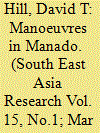| Srl | Item |
| 1 |
ID:
134604


|
|
|
|
|
| Summary/Abstract |
This article examines political exile as a particular form of migration, with reference to Indonesians living in the Union of Soviet Socialist Republics (USSR) when the military regime came to power in their homeland. With the rise in Jakarta of the New Order under Major-General Suharto after 1 October 1965, thousands of Indonesians in socialist and communist states abroad were effectively isolated. Faced with detention or execution if they returned home, Indonesian leftists and other dissidents who were scattered across some dozen states spanning the Sino-Soviet divide became unwilling exiles. Several thousand Indonesians were then studying in the USSR, where they were one of the largest foreign nationalities in Soviet universities and military academies. Many spent nearly half a century as exiles, struggling to survive first the vicissitudes of the cold war and then the global transformations that came with the dissolution of the USSR in December 1991. The most influential grouping of Indonesians who remained in the USSR after 1965 was known as the Overseas Committee of the Indonesian Communist Party. In China, a separate party leadership emerged, known as the Delegation of the Indonesian Communist Party. Mirroring Sino-Soviet rivalries, the Delegation urged Indonesian leftists in the USSR to join them in China. Hundreds did so. These rival factions were separated by mutual distrust until they each disbanded toward the close of the cold war. This article analyzes the changing fate of Indonesians caught in the contradictory relationship between New Order Indonesia and the USSR and in the tensions between the USSR and China as these unwilling exiles were buffeted by geopolitical transformations well beyond their influence.
|
|
|
|
|
|
|
|
|
|
|
|
|
|
|
|
| 2 |
ID:
077666


|
|
|
|
|
| Publication |
2007.
|
| Summary/Abstract |
One of the most visible changes to Indonesian public culture since the fall of President Suharto and his New Order in May 1998 has been the florescence of the nation's media. This article is an initial attempt to examine these changes at the local level in the perimeter province of North Sulawesi, about 2,000 kilometres from the political epicentre of Jakarta. Prior to 1998, with only rare exceptions, studies of the Indonesian media - by both Indonesian and foreign scholars - concentrated on the national media. However, since the post-Suharto deregulation of the media and the dismantling of the repressive Department of Information, which had controlled the media centrally, the most dramatic transformation has been driven not from Jakarta but from local media enterprises. At its broadest, this current study of media in North Sulawesi questions whether the collapse of an authoritarian regime and abandonment of media controls axiomatically produce a pluralist democratic media; or whether, equally as likely, they involve the capture of the media by particular political interests, for whom media influence - if not control - is a valuable asset in influencing public opinion and electoral outcomes
|
|
|
|
|
|
|
|
|
|
|
|
|
|
|
|